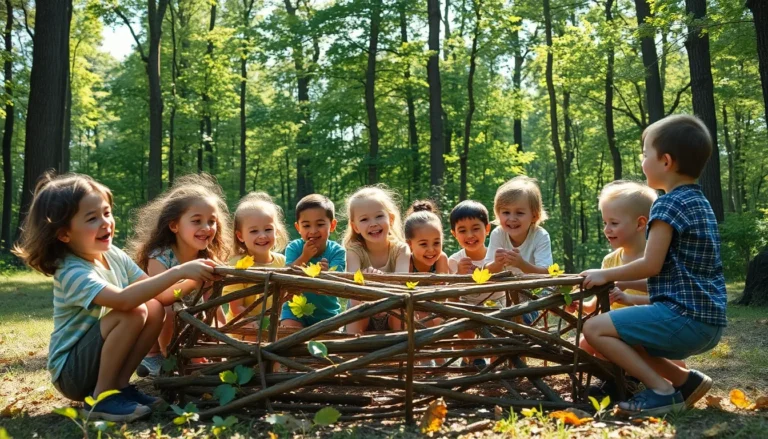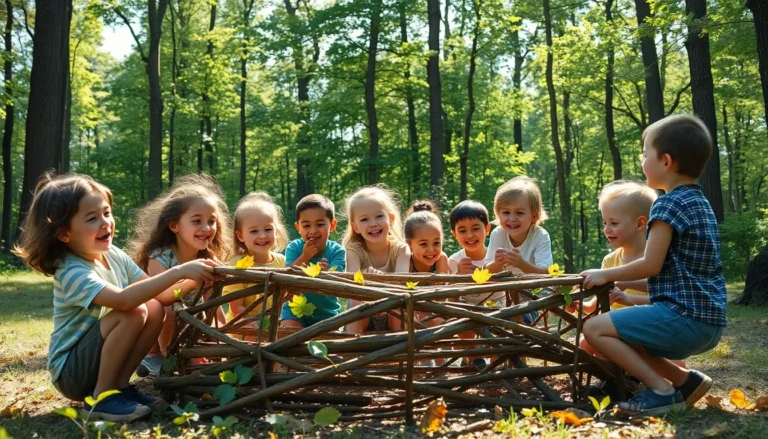Table of Contents
ToggleAs the sun blazes and the school bell rings its last call, kids everywhere are ready to trade textbooks for tents. Summer camp programs offer a delightful escape where laughter echoes through the trees and friendships blossom like wildflowers. It’s not just about arts and crafts; it’s a chance for kids to unleash their inner adventurers and discover new passions—whether that’s conquering the high ropes course or mastering the art of s’mores.
Parents, don’t worry! These camps are designed to keep your little ones engaged while you enjoy a well-deserved break. With a mix of fun, learning, and a sprinkle of mischief, summer camps promise unforgettable experiences. So grab the sunscreen and prepare for a summer packed with excitement, growth, and maybe a few hilarious campfire stories. After all, who wouldn’t want to hear about that time Timmy tried to catch a fish with a stick?
Overview of Summer Camp Programs
Summer camp programs offer diverse experiences for children. These programs feature a variety of activities, including arts, sports, science, and outdoor adventures. Many camps focus on specific themes, such as technology, the environment, or performing arts, providing children with unique opportunities to explore their interests.
Kids often engage in team-building activities, helping them develop social skills and friendships. Structured environments encourage collaboration and mutual respect among peers. Various age groups participate in camps, allowing tailored experiences that cater to specific developmental needs.
Parents find peace of mind knowing their children are in safe and supervised settings. Camps often include trained staff members who prioritize the well-being of every child. Opportunities for personal growth abound, as kids learn new skills and gain confidence through participation.
Flexible scheduling options make it easier for families to find suitable programs. Some camps operate on daily, weekly, or month-long durations, catering to varying schedules and commitments. Affordable pricing structures exist, allowing families from different backgrounds to access these enriching experiences.
Health and safety protocols are paramount in today’s camp environments. Many programs have implemented enhanced measures to ensure the safety of all attendees. This focus on safety provides reassurance for parents, further contributing to the appeal of summer camp programs.
Overall, summer camps foster a spirit of adventure and learning, making them an ideal choice for children seeking memorable summer experiences.
Types of Summer Camp Programs


Summer camp programs offer diverse experiences tailored to children’s interests and needs. These programs typically fall into two main categories: day camps and sleepaway camps.
Day Camps
Day camps provide a structured environment for children to engage in activities while returning home each evening. They typically operate during regular working hours and feature a variety of options, including arts and crafts, sports, and educational workshops. Children benefit from social interaction and skill-building as they explore new interests in a fun, supportive setting. Many day camps cater to specific age groups, ensuring age-appropriate activities and fostering friendships among peers. Parents appreciate the convenience of day camps, as they allow children to enjoy daytime adventures without the overnight commitment.
Sleepaway Camps
Sleepaway camps immerse children in a residential experience, offering the chance to spend nights away from home. These camps often focus on specific themes such as outdoor adventure, science, or performing arts, allowing deeper exploration of interests. Participants develop independence and resilience while engaging in activities like hiking, swimming, or theatrical performances. Sleepaway camps typically run for a week or more, giving campers ample time to foster lasting friendships and memorable experiences. Safety remains a priority, with trained staff supervising all aspects of the camp, ensuring each child’s well-being throughout their stay.
Benefits of Attending Summer Camp Programs
Summer camp programs offer numerous benefits that enhance children’s experiences during their school breaks. These camps focus on social interaction and personal growth, contributing to a well-rounded development.
Social Skills Development
Children strengthen social skills at summer camps through group activities and collaborative tasks. Engaging with peers fosters communication and teamwork abilities. Participants learn to share, compromise, and resolve conflicts, enhancing their interpersonal skills. Camps often encourage friendships through diverse group dynamics, promoting inclusivity. Such environments support emotional regulation, as children navigate relationships and build empathy. Overall, social skills gained at camp extend beyond friendships into everyday interactions and future academic settings.
Personal Growth Opportunities
Camp experiences promote personal growth by encouraging children to step outside their comfort zones. Activities like rock climbing or performing arts help build confidence and resilience. Children also discover their interests through themed programs, enabling them to explore passions in a supportive setting. Learning independence comes naturally as campers make decisions regarding activities and daily routines. Each success, however small, cultivates a sense of achievement. These growth opportunities offer valuable life skills that shape a child’s character and future endeavors.
Choosing the Right Summer Camp Program
Selecting a summer camp program requires careful consideration. Parents should assess several factors to ensure a perfect fit for their children.
Age Appropriateness
Age-appropriate camps provide activities tailored to specific developmental stages. Younger campers benefit from hands-on exploration and structure, while older children thrive in environments that promote independence. Camps often categorize activities by age groups, which fosters peer relationships and socialization. Children engaged in age-appropriate experiences develop confidence and skills that align with their maturity levels. Parents can look for camps explicitly designating age ranges to make informed decisions about their child’s participation.
Interests and Activities Offered
Diverse interests and activities shape each camp’s uniqueness. Camps may focus on areas like arts, sports, science, or outdoor adventures. Specific themes allow children to dive into passions while discovering new hobbies. This variety helps campers find their niche and improve their skills. Parents should consider their child’s individual interests when selecting a camp to enhance their summer experience. Researching available programs enables families to match campers with activities that spark enthusiasm, ensuring an engaging and fulfilling summer.
Summer camp programs offer children a unique opportunity to grow and thrive outside the classroom. With a wide range of activities and themes available, kids can pursue their interests while developing essential social skills and confidence. These experiences not only create lasting memories but also equip children with valuable life skills that extend beyond the camp environment.
Parents can play a crucial role in this journey by selecting the right camp that aligns with their child’s interests and developmental stage. By doing so, they ensure that their child enjoys a summer filled with adventure, learning, and personal growth. The joy of summer camp awaits, promising an enriching experience that children will cherish for years to come.




